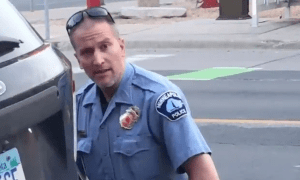In the wake of George Floyd’s brutal murder in Minnesota and the resulting nationwide protests against police brutality and racism, there’s been a lot of hopeful talk about the possibility of structural change.
It’s not going to happen.
Granted, there have been positive steps taken around the country. New York State, for example, just put in place several reforms—including the banning of chokeholds and the opening up of police disciplinary records—that should make it easier to prosecute individual cops who commit murder. That’s the theory, at any rate.

But already, ambitious reforms are running into age-old roadblocks. This is certainly the case in Minneapolis, where Floyd was killed, and it will prove to be the case elsewhere as well.
Structural change is hard. Especially when the conditions for it do not exist. And the conditions for it do not exist in these so-called United States.
To actually change the system, a great majority of the populace must agree there is a great need to do so. But in the U.S., a substantial portion of the population does not agree such a need exists. A substantial portion of the population does not agree on anything.
While earnest and appalled citizens were taking to the streets to protest racism, millions of others were challenging them, on the streets and, especially, on social media, with “All Lives Matter” or “Blue Lives Matter” taunts. Others have signed on to the so-called boogaloo movement, which wants to incite civil war and overthrow the government. And that movement has plenty of company on the far right.
Meanwhile, the nation’s government itself works against the interest of its citizens on a daily basis (see Covid–19, America’s failure to respond) and pays the most token of lip service to protesters’ demands for change.
As much as all reasonable and empathetic citizens would like to change America, we must face the truth of life in this country today:
- Racism is built-in. It’s not going away.
- America’s cultural and political divisions may have reached an all-time high, and there is no fix for this on the horizon.
- There are many good cops, as the truism goes. But there are many more bad cops. They join the force from warehouses and fast food restaurants and become drunk with their newfound salaries, benefits and power. What’s more, they become part of a cool blue fraternity that always sticks together. I contend that the worst young men and women in America aspire to join the police precisely because they will be able to commit violence with impunity.
- America’s two-party system is hopelessly hamstrung in terms of flexibility and rapid response. And it, like the people it supposedly serves, is also crippled by cultural and political divisions, likely beyond repair.
- There are too many stupid politicians and too many stupid cops. If we don’t have a competent and professional government, how can we expect to have a competent and professional police force?
- The ideal solution to eliminate killings by the police would be to disarm them, as in Britain and other countries. Oh, wait—there are more than 300 million firearms floating around the United States. Guess that’s not such a practical idea.
- Well then, what if we got rid of all the guns, then disarmed the police? Yeah, good luck with that one. Refer to all the points made above.
Our country is irremediably broken, folks. Outrageous police brutality is just the latest systemic problem we will not be able to resolve, at least not as the U.S. is presently constituted. And racism, of course, is our original sin. It endures.
It’s not just police departments that need to be dismantled and rebuilt more intelligently.
It’s the nation itself.
